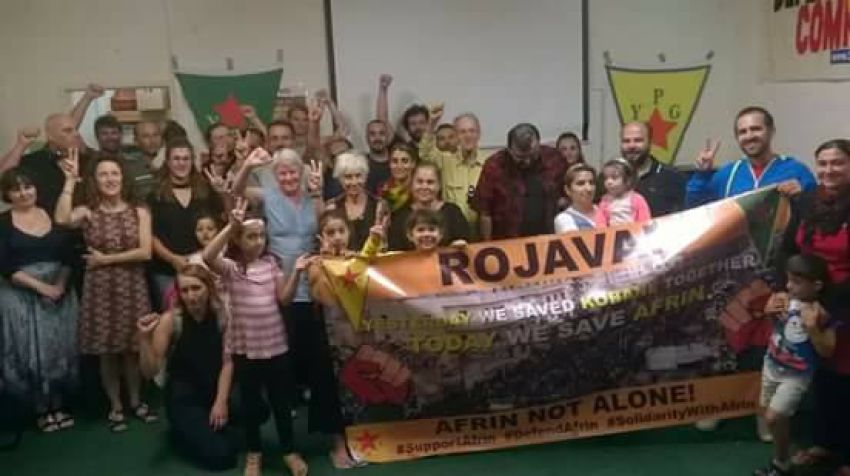
Green Left Weekly hosted a screening in Perth of the film Kurdistan: Women at War on March 9 to celebrate International Women’s Day. The film, directed by Mylene Sauloy, follows the historical development of the Women’s Protection Units (YPJ) and other similar groups defending and transforming their communities across Northern Syria.
Since the beginning of the civil war in Syria, when conflict created a vacuum of political power, people in the predominantly Kurdish north of the country have initiated a social revolution that has resulted in women playing a central role in new democratic and inclusive methods of community organising.
Women co-chair every school, workplace and government structure, while the different ethnic and religious communities now also enjoy equal social status and representation. Participatory decision making and concern for the environment are also key pillars of the new society being created in the midst of a war zone.
Almost immediately, this experiment came under fierce attack, first by Islamic State and now by Turkey and its jihadist allies inside Syria. The heroic defence of the town of Kobane in 2014–15 caught the attention of the world. The YPJ and the People's Protection Units (YPG) were in the front line and succeeded in stopping the advance of Islamic State, an advance Turkey and other regional powers actually encouraged and facilitated materially.
The Turkish state, which for decades has sought to eradicate Kurdish political and cultural aspirations within Turkey, sees this organic revolution on its doorstep as a direct challenge to its hegemonic nationalist aims within Turkey and its ability to control events in the region.
With the failure of Islamic State to overwhelm the resistance at Kobane, Turkey, the second largest army in NATO, has now launched a frontal attack on Afrin, a canton within the Democratic Federation of Northern Syria. This canton, geographically isolated from the rest of the DFNS and home to many thousands of refugees from other areas of Syria, is seen by the Turkish regime as an easy target.
Such is the danger of Afrin being overrun by the Turkish army and jihadists that the Kurdish community in Perth and supporters held the film screening for IWD with the aim of building local solidarity. The event was a great success.
However, it was marred by the efforts of Turkish nationalists, waving flags, blaring music and calling families with children present terrorists, to disrupt the event and intimidate attendees. At one point, there was a genuine fear they would try to physically force themselves into the building. Doors were locked and the police called.
Local Kurdish community member Brin told the audience, "What you see here is incomparable to the violence people in Turkey and Syria are facing. In Afrin, every day people are killed, while in Turkey if you are a Kurd or you stand up, you face being beaten and jailed."
In its efforts to suppress the Kurds culturally and politically, Turkey has labelled the Kurdish Worker's Party (PKK) a terrorist organisation, and has successfully lobbied governments around the world, including its NATO partners and Australia, to do the same. This has been extended to the YPJ, with the recent dramatic incident when scores of German riot police entered a home to remove a YPJ flag from a window.
The irony is that Turkey, under its president Recep Tayyip Erdogan, is fast descending into a fascist state and has actively sponsored Islamic State. Yet it is able to foster a global ban on the YPJ, the frontline fighters against Islamic State terrorists.
The Australian government’s listing of the PKK as a terrorist organisation significantly effects the ability of left and democratic forces here to provide meaningful support to those desperately defending themselves and their revolution in Afrin.
This is why the national campaign here in Australia to have the PKK delisted as a terrorist group is so important, both for Afrin and the fight against fascism everywhere.
Like the article? Subscribe to Green Left now! You can also like us on Facebook and follow us on Twitter.